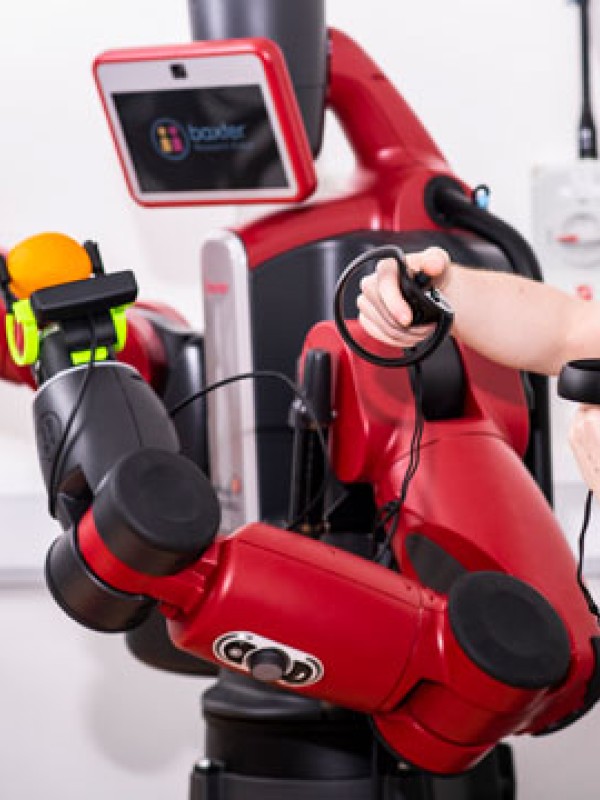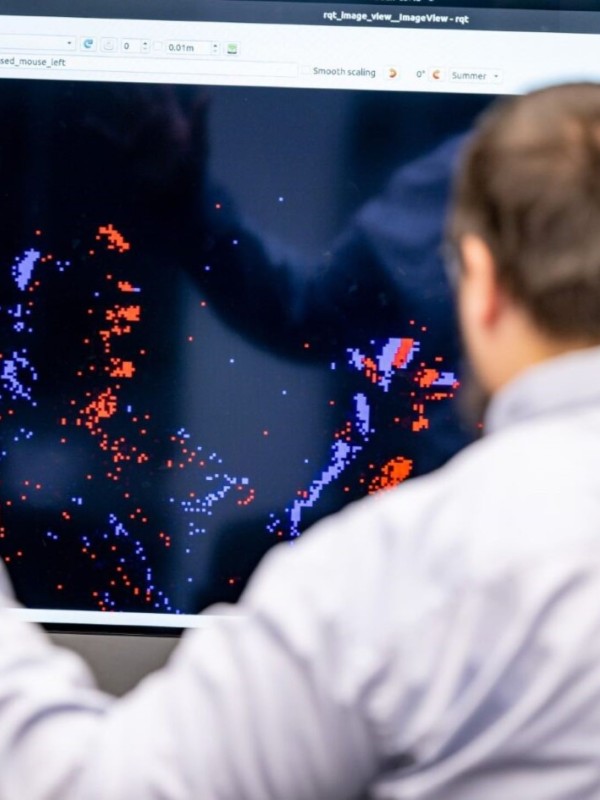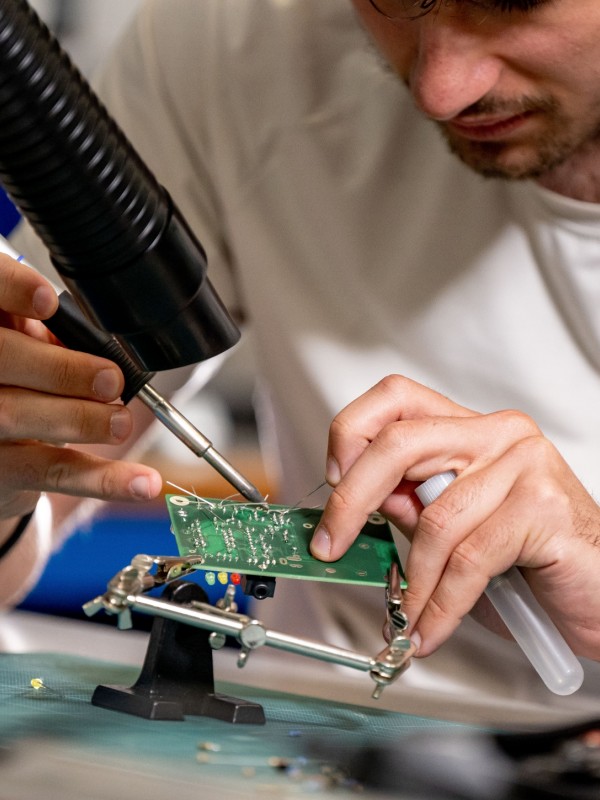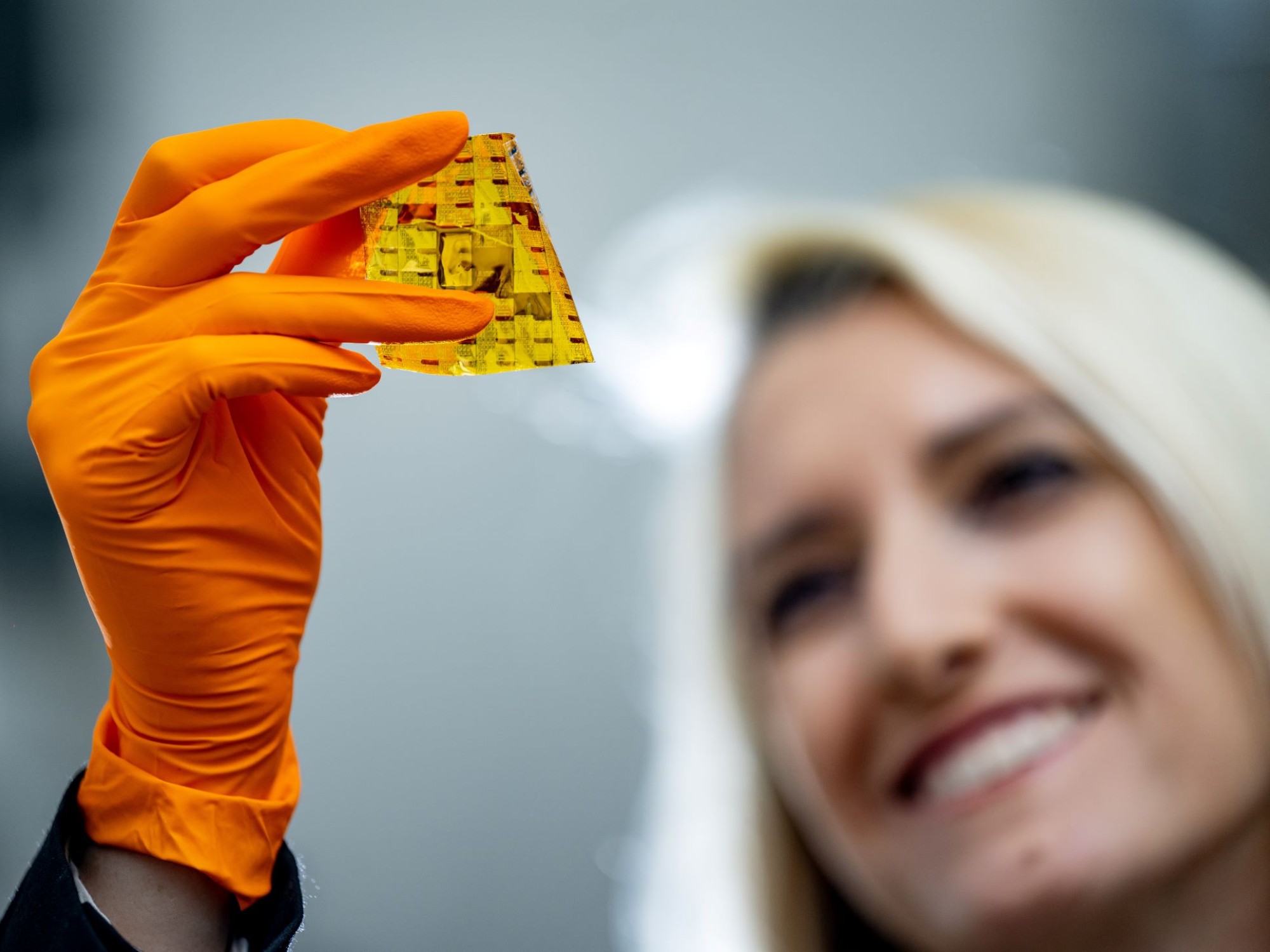
- Nanotechnology and Renewable Energy
MSc — 2025 entry Nanotechnology and Renewable Energy
Our Nanotechnology and Renewable Energy MSc explores the practical implementation of nanoscience and nanomaterials for clean and green energy applications. This course will provide you with the essential skills needed to advance your career in the rapidly developing renewable energy field.
Why choose
this course?
Could the design of novel nanomaterials based on atoms and molecules hold the secret to saving our planet from predicted climate catastrophe? Will solar energy provide the long-term alternative to fossil fuels? And how will we successfully harvest this energy?
Our MSc allows you to discover the practical implementation of nanoscience, quantum engineering, nanomaterials and nanotechnology for renewable energy generation and storage.
You’ll be taught by world-leading experts at the University’s Advanced Technology Institute, and gain specialised skills through an individual research project within our research groups, using the latest advanced equipment and facilities.
Statistics
96%
of our electrical and electronic engineering postgraduate taught students go on to employment or further study (Graduate Outcomes 2024, HESA)
Accreditation
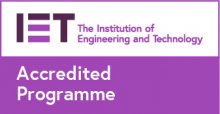
What you will study
You’ll begin by learning the fundamentals behind nanotechnology, before examining its implementation using nanomaterials – such as graphene, carbon nanotubes, 2D materials and perovskite solar cells.
You'll discover how advanced nanotechnology tools are used to allow us to see things at a nanoscale, while learning about future trends and applications for energy generation and storage. Topics include sustainable energy generation from solar, thermo electrics, piezo electrics, tribo electrics and hydrogen fuels cells, and storage with supercapacitors and batteries.
You can take part in the clean energy revolution taking place today, where the decarbonising of energy is the number one priority around the world.
Professional recognition
MSc - Institution of Engineering and Technology (IET)
Accredited by the Institution of Engineering and Technology (IET) on behalf of the Engineering Council for the purposes of fully meeting the academic requirement for registration as an Incorporated Engineer and partially meeting the academic requirement for registration as a Chartered Engineer.
Research
Our Advanced Technology Institute has more than 20 years of research experience in nanomaterials. Our expertise within the areas of electronics and photonics has contributed to multibillion-dollar industries.
You’ll not only learn from academics in this research institute, but you’ll also have the opportunity to carry out exciting research in high-quality fabrication facilities.
If you’re studying this course full-time, you’ll study eight modules across the year – four in each semester.
You will work on your project full-time during the summer period for approximately two-and-a-half months, and prior to that, during semester time, you will work on the initial stages of the project part-time and complete an interim report. This means that if you begin your course in February, you will complete your project in between the two semesters, and if you begin your course in September, you will complete your project after the two semesters.
You can also study this MSc part-time, taking between two and five years. You can study between two and six modules each year and the length taken to complete the MSc depends on how many modules you choose. We recommend part-time students work on their project in their final year of study when all eight modules have either been completed or are near completion.
The structure of our programmes follows clear educational aims that are tailored to each programme. These are all outlined in the programme specifications which include further details such as the learning outcomes:
Modules
Modules listed are indicative, reflecting the information available at the time of publication. Modules are subject to teaching availability, student demand and/or class size caps.
The University operates a credit framework for all taught programmes based on a 15-credit tariff, meaning all modules are comprised of multiples of 15 credits, up to a maximum of 120 credits.
Course options
Year 1
Semester 1
Compulsory
Expected prior learning: Students should have an interest in materials and devices Module purpose: Nanotechnology promises new strong and light materials, faster electronic devices which consume less energy and have enhanced functionality. Nanotechnology and nanomaterials are everywhere; it is on the nanometer scale that many of the well-known descriptions and properties of materials breakdown and where an understanding of quantum effects becomes vital. New materials such as graphene and carbon nanotubes with outstanding physical and electronic properties have emerged. This module will introduce quantum engineering and new nanomaterials as well as showing how developments have led to unprecedented ability to see and manipulate atoms and materials on the nanoscale. The module builds upon prior study of electronic materials delivered in Year 2 of the undergraduate programme such as EEE2040 Electronic and Photonics Devices, EEE2045 Electrical Science II. This module facilitates future advanced master level leaning in advanced and modern electronic materials and devices such as in module EEEM022 Nanoelectronics and Devices.
View full module detailsExpected prior learning: Students should have an interest in practical aspects of experimental methods in nanotechnology applications. Module purpose: This module provides students with an introduction to some of the most widely used experimental techniques and skills in engineering applications that leverage phenomena on the nanoscale, from characterising new solar cells to measuring the morphology and properties of thin layers down to single-sheet 2D materials. The module introduces students to key transferrable research skills, building confidence and competence in how to use statistical analytical tools to design experiments and significantly reduce the number of redundant experiments in quality assurance of manufacturing processes, improving their resilience and sustainability. EEEM050 complements fundamental aspects of nanoengineering taught in parallel in EEE3037 and provides essential learning for experimental project dissertations in EEEM004.
View full module detailsExpected prior learning: None. Module purpose: To inform students as to the importance of renewable energy in the energy mix required for generation within nations. This is now becoming law in developed countries following the Kyoto agreement and green energy obligations. Students will learn as to the various energy generation options available from power scavengers for handheld calculators to energy generation to power the world’s energy need. Furthermore, an appreciation for the need for energy storage at all power levels will be discussed, with special emphasis on the materials requirements. Students will be able to examine next generation materials being proposed for meeting world's demand based on green energy.
View full module detailsOptional
Radio frequency (RF) and microwave engineers require proficiency in a specific set of skills to in electronic circuitry that does not exist for other typical applications. Therefore, a good grounding in the electronics associated with RF and microwave devices and important underlying essential fundamentals are delivered for any form of RF or microwave engineering. The module will be important for other RF related modules such as EEEM044 RF System and Circuit Design and EEEM064 Microwave Design Techniques
View full module detailsWhen considering how to reduce the environmental impacts of a product, a service, an organisation, a household or even a nation, it is vital to take a life cycle approach. A life cycle approach considers the environmental impact over the full life cycle of the product– from its design, raw material extraction, manufacturing, distribution, consumption and then disposal or recycling at the end of the product’s life. In this module we introduce participants to life cycle thinking, the concept of the circular economy, life cycle management and related environmental systems analysis approaches. We consider how such approaches can help inform sustainability trade-offs, thus leading to better-informed decisions.
View full module detailsThis module provides a comprehensive and challenging exploration of the core concepts, policy challenges and ethical issues in Sustainable Development. It is aimed at a wide range of students and takes a trans-disciplinary approach to exploring the frontier of sustainable development. The module provides a grounding in sustainability ideas and issues that is self-contained, but it also prepares students to get the best from the complementary module on Sustainable Development Applications (ENGM067). The module is suitable as a foundation for students who have not previously studied sustainability and provides an update on the frontier issues of sustainability for those who have.
View full module detailsSemester 2
Compulsory
Expected prior/parallel learning: Students should have an interest in materials and devices; it would be of benefit to have studied EEE3037 Nanoscience and Nanotechnology. Module purpose: Nanoelectronics represent the ultimate in advanced electronic device design and operation. At the nanoscale the quantum nature of matter is evident in the operation of faster, energy efficient devices with greater functionality. New materials, such as graphene and new molecular electronic materials, offer unique electronic properties which continually emerge in parallel to advances in device architecture and performance aligned to the International Roadmap for Devices and Systems. This module will introduce some of the key concepts in low dimensional mesoscopic science and engineering, and molecular electronics and associated devices. The module builds on materials seen earlier in the undergraduate programme such as in EEE2042 Electronic and Photonic Devices, EEE2045 Electrical Science II, EEE3037 Nanoscience and Nanotechnology and EEE3041 Semiconductor Devices and Optoelectronics.
View full module detailsDeveloping high-performance energy storage devices such as lithium-ion batteries could greatly promote the development of portable electronics, vehicle electrification and smart grid, alleviate environmental pollution and reduce our dependence on fossil fuels, addressing the “grand challenges” in the sustainability and resilience of environments. This module aims to introduce fundamental scientific, technological or engineering principles and technology applications of batteries used in different electrical systems. Students will learn as to the battery types, battery parts and how to test/monitor a battery. Battery performance requirement by electric vehicles, smart grids, next-generation electronics and electrical systems will also be covered in this module. The discussion of new materials goes beyond that found in EEE3037 Nanoscience and Nanotechnology.
View full module detailsCore
This module is aimed at forming essential professional skills and competences in research and innovation for master level students studying in programmes relating to computer science and/or electronic engineering. It will therefore serve as an important initial module towards planning and executing the dissertation project through learning about literature reviewing and research methodologies. Furthermore, it will facilitate team building skills through identifying individual strengths and exercising capability through group design work. This experience will also make the student aware of the challenges of working effectively with other people.
View full module detailsOptional
Expected prior learning: Module EEE2042 – Electronic and Photonic Devices, or equivalent learning, is advisory but not required. Module purpose: Semiconductor devices and optoelectronics play a major technology enabling amongst other things the internet. The course is given via a series of lectures and aims to give a background to the interaction of light with key photonic materials and devices. This module will introduce students to modern energy efficient electronic and photonic devices concentrating on the fundamental science of operation, device structure and characteristics.
View full module detailsWind energy is an emerging renewable technology that has received wide attention in the context of dealing with global energy demand and sustainable development. It is a broad subject encompassing several branches of science and engineering. This module is to introduce the concept, technical approaches, and the practical aspects in applications.
View full module detailsThis module introduces the fundamentals of energy and environmental economics to students covering appropriate economic theory, empirical and case studies and policy aspects.
View full module detailsSemester 1 & 2
Core
Expected prior learning: Appropriate background knowledge related to the project topic. Module purpose: This is an individual student project module giving each masters student an opportunity to gain realistic experience in developing a solution to a problem from its inception to a demonstrable result. It provides a framework as well as a vehicle for exercising all key aspects of project work, from project specification, through literature and technology research, leading to project planning, problem solving as well as design and implementation, culminating in performance assessment, project demonstration, and project evaluation. It also provides a scope for gaining practical experience interpersonal skills, use of IT, project management, project reporting and project presentation. The project can be either of engineering design nature or have a research flavour. This module is complementary to all other taught modules in order to apply the learning gained into undertaking an independent piece of research and/or development.
View full module detailsOptional modules for Year 1 (full-time) - FHEQ Levels 6 and 7
One optional module in Semester 1
One optional module in Semester 2
Only one level 6 optional module can be selected
Unstructured years
Semester 1
Compulsory
Expected prior learning: Students should have an interest in materials and devices Module purpose: Nanotechnology promises new strong and light materials, faster electronic devices which consume less energy and have enhanced functionality. Nanotechnology and nanomaterials are everywhere; it is on the nanometer scale that many of the well-known descriptions and properties of materials breakdown and where an understanding of quantum effects becomes vital. New materials such as graphene and carbon nanotubes with outstanding physical and electronic properties have emerged. This module will introduce quantum engineering and new nanomaterials as well as showing how developments have led to unprecedented ability to see and manipulate atoms and materials on the nanoscale. The module builds upon prior study of electronic materials delivered in Year 2 of the undergraduate programme such as EEE2040 Electronic and Photonics Devices, EEE2045 Electrical Science II. This module facilitates future advanced master level leaning in advanced and modern electronic materials and devices such as in module EEEM022 Nanoelectronics and Devices.
View full module detailsExpected prior learning: Students should have an interest in practical aspects of experimental methods in nanotechnology applications. Module purpose: This module provides students with an introduction to some of the most widely used experimental techniques and skills in engineering applications that leverage phenomena on the nanoscale, from characterising new solar cells to measuring the morphology and properties of thin layers down to single-sheet 2D materials. The module introduces students to key transferrable research skills, building confidence and competence in how to use statistical analytical tools to design experiments and significantly reduce the number of redundant experiments in quality assurance of manufacturing processes, improving their resilience and sustainability. EEEM050 complements fundamental aspects of nanoengineering taught in parallel in EEE3037 and provides essential learning for experimental project dissertations in EEEM004.
View full module detailsExpected prior learning: None. Module purpose: To inform students as to the importance of renewable energy in the energy mix required for generation within nations. This is now becoming law in developed countries following the Kyoto agreement and green energy obligations. Students will learn as to the various energy generation options available from power scavengers for handheld calculators to energy generation to power the world’s energy need. Furthermore, an appreciation for the need for energy storage at all power levels will be discussed, with special emphasis on the materials requirements. Students will be able to examine next generation materials being proposed for meeting world's demand based on green energy.
View full module detailsOptional
Radio frequency (RF) and microwave engineers require proficiency in a specific set of skills to in electronic circuitry that does not exist for other typical applications. Therefore, a good grounding in the electronics associated with RF and microwave devices and important underlying essential fundamentals are delivered for any form of RF or microwave engineering. The module will be important for other RF related modules such as EEEM044 RF System and Circuit Design and EEEM064 Microwave Design Techniques
View full module detailsWhen considering how to reduce the environmental impacts of a product, a service, an organisation, a household or even a nation, it is vital to take a life cycle approach. A life cycle approach considers the environmental impact over the full life cycle of the product– from its design, raw material extraction, manufacturing, distribution, consumption and then disposal or recycling at the end of the product’s life. In this module we introduce participants to life cycle thinking, the concept of the circular economy, life cycle management and related environmental systems analysis approaches. We consider how such approaches can help inform sustainability trade-offs, thus leading to better-informed decisions.
View full module detailsThis module provides a comprehensive and challenging exploration of the core concepts, policy challenges and ethical issues in Sustainable Development. It is aimed at a wide range of students and takes a trans-disciplinary approach to exploring the frontier of sustainable development. The module provides a grounding in sustainability ideas and issues that is self-contained, but it also prepares students to get the best from the complementary module on Sustainable Development Applications (ENGM067). The module is suitable as a foundation for students who have not previously studied sustainability and provides an update on the frontier issues of sustainability for those who have.
View full module detailsSemester 2
Compulsory
Expected prior/parallel learning: Students should have an interest in materials and devices; it would be of benefit to have studied EEE3037 Nanoscience and Nanotechnology. Module purpose: Nanoelectronics represent the ultimate in advanced electronic device design and operation. At the nanoscale the quantum nature of matter is evident in the operation of faster, energy efficient devices with greater functionality. New materials, such as graphene and new molecular electronic materials, offer unique electronic properties which continually emerge in parallel to advances in device architecture and performance aligned to the International Roadmap for Devices and Systems. This module will introduce some of the key concepts in low dimensional mesoscopic science and engineering, and molecular electronics and associated devices. The module builds on materials seen earlier in the undergraduate programme such as in EEE2042 Electronic and Photonic Devices, EEE2045 Electrical Science II, EEE3037 Nanoscience and Nanotechnology and EEE3041 Semiconductor Devices and Optoelectronics.
View full module detailsDeveloping high-performance energy storage devices such as lithium-ion batteries could greatly promote the development of portable electronics, vehicle electrification and smart grid, alleviate environmental pollution and reduce our dependence on fossil fuels, addressing the “grand challenges” in the sustainability and resilience of environments. This module aims to introduce fundamental scientific, technological or engineering principles and technology applications of batteries used in different electrical systems. Students will learn as to the battery types, battery parts and how to test/monitor a battery. Battery performance requirement by electric vehicles, smart grids, next-generation electronics and electrical systems will also be covered in this module. The discussion of new materials goes beyond that found in EEE3037 Nanoscience and Nanotechnology.
View full module detailsCore
This module is aimed at forming essential professional skills and competences in research and innovation for master level students studying in programmes relating to computer science and/or electronic engineering. It will therefore serve as an important initial module towards planning and executing the dissertation project through learning about literature reviewing and research methodologies. Furthermore, it will facilitate team building skills through identifying individual strengths and exercising capability through group design work. This experience will also make the student aware of the challenges of working effectively with other people.
View full module detailsOptional
Expected prior learning: Module EEE2042 – Electronic and Photonic Devices, or equivalent learning, is advisory but not required. Module purpose: Semiconductor devices and optoelectronics play a major technology enabling amongst other things the internet. The course is given via a series of lectures and aims to give a background to the interaction of light with key photonic materials and devices. This module will introduce students to modern energy efficient electronic and photonic devices concentrating on the fundamental science of operation, device structure and characteristics.
View full module detailsWind energy is an emerging renewable technology that has received wide attention in the context of dealing with global energy demand and sustainable development. It is a broad subject encompassing several branches of science and engineering. This module is to introduce the concept, technical approaches, and the practical aspects in applications.
View full module detailsThis module introduces the fundamentals of energy and environmental economics to students covering appropriate economic theory, empirical and case studies and policy aspects.
View full module detailsSemester 1 & 2
Core
Expected prior learning: Appropriate background knowledge related to the project topic. Module purpose: This is an individual student project module giving each masters student an opportunity to gain realistic experience in developing a solution to a problem from its inception to a demonstrable result. It provides a framework as well as a vehicle for exercising all key aspects of project work, from project specification, through literature and technology research, leading to project planning, problem solving as well as design and implementation, culminating in performance assessment, project demonstration, and project evaluation. It also provides a scope for gaining practical experience interpersonal skills, use of IT, project management, project reporting and project presentation. The project can be either of engineering design nature or have a research flavour. This module is complementary to all other taught modules in order to apply the learning gained into undertaking an independent piece of research and/or development.
View full module detailsOptional modules for Unstructured (3-5 years) - FHEQ Levels 6 and 7
One optional module in Semester 1
One optional module in Semester 2
Only one level 6 optional module can be selected
General course information
Contact hours
Contact hours can vary across our modules. Full details of the contact hours for each module are available from the University of Surrey's module catalogue. See the modules section for more information.
Timetable
Course timetables are normally available one month before the start of the semester.
New students will receive their personalised timetable in Welcome Week, and in subsequent semesters, two weeks prior to the start of semester.
Please note that while we make every effort to ensure that timetables are as student-friendly as possible, scheduled teaching can take place on any day of the week (Monday – Friday). Wednesday afternoons are normally reserved for sports and cultural activities. Part-time classes are normally scheduled on one or two days per week, details of which can be obtained from Academic Administration.
Location
This course is based at Stag Hill campus. Stag Hill is the University's main campus and where the majority of our courses are taught.
We offer careers information, advice and guidance to all students whilst studying with us, which is extended to our alumni for three years after leaving the University.
This course is specifically designed to equip you for work in the energy industry, most notably in the rapidly expanding area of solar energy and storage. It will also provide you with the opportunity to pursue further research through a PhD.
96 per cent of our electrical and electronic engineering postgraduate taught students go on to employment or further study (Graduate Outcomes 2024, HESA).
UK qualifications
A minimum of a 2:2 UK honours degree in advanced materials, electronic engineering, materials science, nano sciences, chemistry or physics, or a recognised equivalent international qualification.
We’ll also consider relevant work experience if you don’t meet these requirements.
English language requirements
IELTS Academic: 6.5 overall with 6.0 in writing and 5.5 in each other element.
These are the English language qualifications and levels that we can accept.
If you do not currently meet the level required for your programme, we offer intensive pre-sessional English language courses, designed to take you to the level of English ability and skill required for your studies here.
Recognition of prior learning
We recognise that many students enter their course with valuable knowledge and skills developed through a range of ways.
If this applies to you, the recognition of prior learning process may mean you can join a course without the formal entry requirements, or at a point appropriate to your previous learning and experience.
There are restrictions for some courses and fees may be payable for certain claims. Please contact the Admissions team with any queries.
Scholarships and bursaries
Discover what scholarships and bursaries are available to support your studies.
Fees
Explore UKCISA’s website for more information if you are unsure whether you are a UK or overseas student. View the list of fees for all postgraduate courses.
September 2025 - Full-time - 1 year
- UK
- £12,400
- Overseas
- £24,900
September 2025 - Part-time - 5 years
- UK
- £1,400 per 15 credits
- Overseas
- £2,800 per 15 credits
- For the unstructured self-paced part-time course, the fee shown above is per 15 credits for the 2024-25 academic year
- The dissertation module is charged as a 15-credit module for fee purposes
- These fees apply to students commencing study in the academic year 2025-26 only. Fees for new starters are reviewed annually.
Payment schedule
- Students with Tuition Fee Loan: the Student Loans Company pay fees in line with their schedule (students on an unstructured self-paced part-time course are not eligible for a Tuition Fee Loan).
- Students without a Tuition Fee Loan: pay their fees either in full at the beginning of the programme or in two instalments as follows:
- 50% payable 10 days after the invoice date (expected to be October/November of each academic year)
- 50% in January of the same academic year.
- Students on part-time programmes where fees are paid on a modular basis: cannot pay fees by instalment.
- Sponsored students: must provide us with valid sponsorship information that covers the period of study.
The exact date(s) will be on invoices.
Additional costs
Books/stationery/admin: Costs may be incurred associated with the purchase of writing paper.
Funding
You may be able to borrow money to help pay your tuition fees and support you with your living costs. Find out more about postgraduate student finance.
Apply online
To apply online first select the course you'd like to apply for then log in.
Select your course
Choose the course option you wish to apply for.
Sign in
Create an account and sign into our application portal.
Please note that we may have to close applications before the stated deadline if we receive a high volume of suitable applications. We advise you to submit your application as soon as it is ready.
ApplyPlease note that we may have to close applications before the stated deadline if we receive a high volume of suitable applications. We advise you to submit your application as soon as it is ready.
ApplyAdmissions information
Once you apply, you can expect to hear back from us within 14 days. This might be with a decision on your application or with a request for further information.
Our code of practice for postgraduate admissions policy explains how the Admissions team considers applications and admits students. Read our postgraduate applicant guidance for more information on applying.
About the University of Surrey
Need more information?
Contact our Admissions team or talk to a current University of Surrey student online.
Terms and conditions
When you accept an offer to study at the University of Surrey, you are agreeing to follow our policies and procedures, student regulations, and terms and conditions.
We provide these terms and conditions in two stages:
- First when we make an offer.
- Second when students accept their offer and register to study with us (registration terms and conditions will vary depending on your course and academic year).
View our generic registration terms and conditions (PDF) for the 2024/25 academic year, as a guide on what to expect.
Disclaimer
This online prospectus has been published in advance of the academic year to which it applies.
Whilst we have done everything possible to ensure this information is accurate, some changes may happen between publishing and the start of the course.
It is important to check this website for any updates before you apply for a course with us. Read our full disclaimer.

